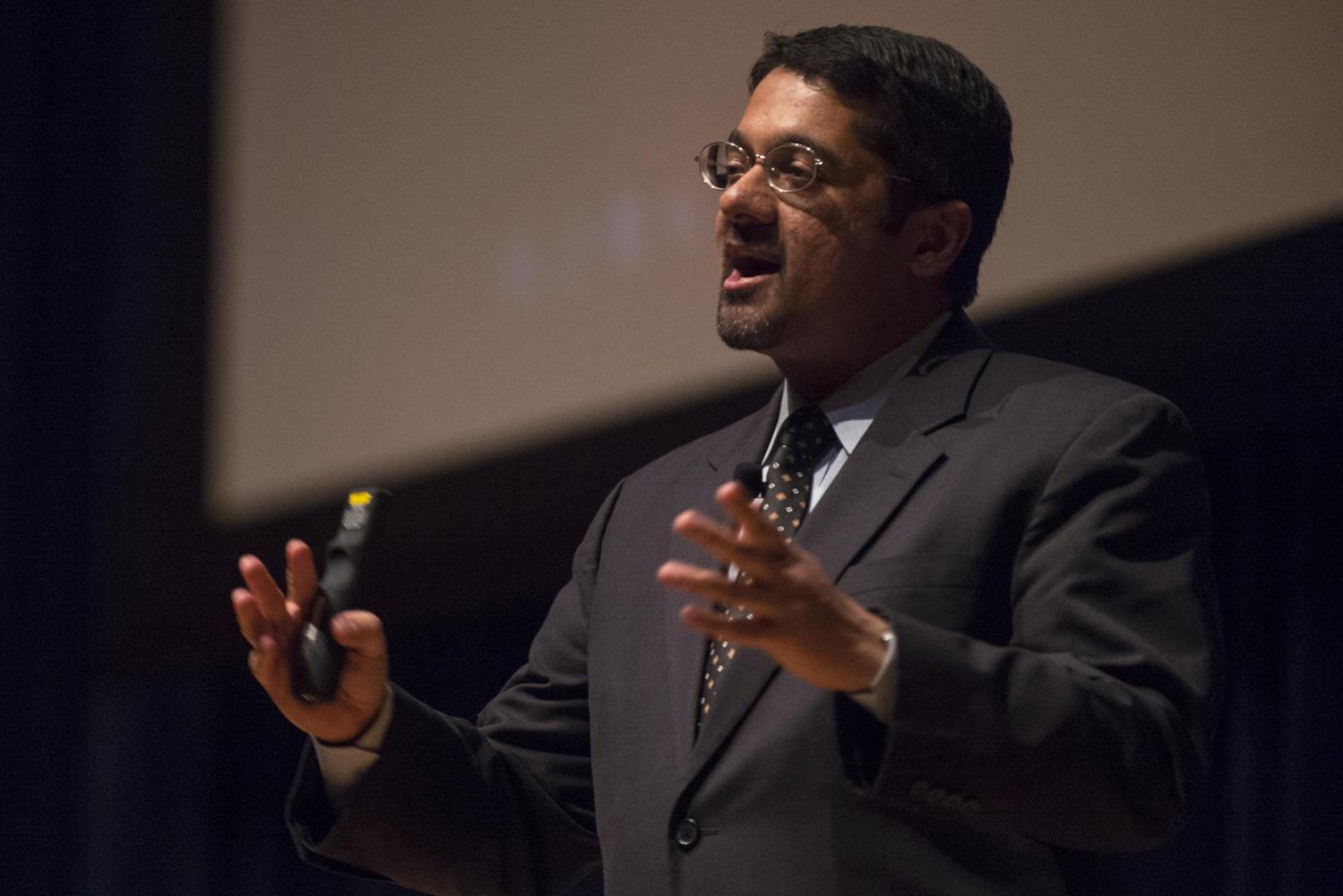NPR correspondent reveals hidden brain


Shankar Vedantam, National Public Radio’s social correspondent and host of the “Hidden Brain” podcast, held a lecture on the brain, human behavior and unconscious biases in the Carnegie Music Hall Wednesday night. (Photo via Wikimedia Commons)
The human brain cannot see reality correctly, according to Shankar Vedantam.
Vedantam, National Public Radio’s social science correspondent, asserts that the subconscious is so powerful it dramatically impacts the way people view the world. But he believes people can overcome these biases with big data — large quantities of data that show trends.
The host of the NPR podcast “Hidden Brain” spoke at the Carnegie Music Hall Wednesday night about the world that can be discovered with big data. The night was sold out, but a few seats were empty on the snowy evening.
He compared the perspective gained through big data to Plato’s allegory of the cave. In the allegory, a group of prisoners are bound in chains so that they can only look forward. On the wall in front of them are shadows created by fire. They have never seen the light of day and don’t know that the shadows aren’t real people and objects. One prisoner is freed and discovers the fire and learns that there’s an entire reality outside of the cave. To Vedantam, this freed prisoner represents big data.
“There is a reality beyond shadows that is more deep,” Vedantam said.
Vedantam said algorithms and computers think about information in a way that is imperceptible to humans. The human mind isn’t designed to see reality accurately, he said — it’s built for survival.
After presenting a series of images and videos — a carousel that slowly changed color, a slide with the text “spot the the mistake” — he challenged the audience to identify what was wrong with the slides. Despite being told there was a flaw, the audience was unable to identify what was wrong. Vedantam said this is due to the subconscious mind automatically filtering the perception of reality.
“Your hidden brain is not under your conscious control,” Vedantam said.
He then related this to biases people may hold. He said it’s not enough to simply know that a subconscious exists or that it can play into bias, but that individuals need to actively work toward changing it.
Using his own podcasts as examples, Vedantam compared the number of men and women he interviewed and realized he was subconsciously giving preference to men. While he wasn’t aware this was a bias he held, the data allowed him to see how his subconscious affected his decision-making.
He is critical of relying on data and technology, though. He identified hubris as a problem he often sees with data analysis methods, describing it as “the air that Silicon Valley engineers have” in believing humans can be replaced by computers.
Vedantam advocated that computers can’t replace humans, but humans should try to learn from algorithms for decision-making. However, he said this is often very difficult because, like the prisoners in the cave, it’s difficult to imagine an entirely different reality.
“The computer is not very good at telling us what it knows,” Vedantam said.
People run into the issue of not being receptive to hearing that they have a flawed worldview, he said. Data can even cause immense psychological pain or numbness to human suffering. Vedantam cited Betsy Paluck, a MacArthur fellow, who found that when people learn about all the lives they can’t save, they become less motivated to help those who they can help.
These limitations, along with an unwillingness to hold opinions that are abnormal, are major influences on political belief, Vedantam said. He said people are less likely to act according to their own beliefs and more likely on what they believe is the social norm. This thinking has led him to a positive outlook on critics of the #MeToo movement, concluding that once society deems a sexual assault culture inexcusable, even critics of the movement will publicly support it.
Kate McFarland, 32, of Robinson Township, said Vedantam’s discussion of groupthink was especially relevant for today’s political climate. She thought it was fascinating that people often disregard their own beliefs to act in line with a group.
“It was really fun and interesting to hear how people tend to fall into categories and align themselves with groups instead of aligning with their own individual thoughts,” McFarland said.
Sarah Ahern was already familiar with Vedantam, and she particularly enjoyed when he showed the audience how the subconscious mind affected them.
“I was excited to see the tricks he played on the audience,” Ahern, a 32-year-old from Regent Square, said. “We think we’re smart and educated, but our brains are designed a certain way.”
Vedantam said that going forward, data analysis techniques can help combat the design of our brains. He also said as we learn to better integrate data technology into our decisions, he hopes humans can become more introspective and learn more about who we are and our place in the world.
“Big data offers a seductive promise — it can show you reality in a way you haven’t seen before,” Vedantam said.
Recent Posts
Pitt men’s basketball navigating transfer portal difficulties
Pitt men’s basketball is like any other team in the world of large NIL deals…
Column | Pirates shouldn’t rush David Bednar back to Pittsburgh
David Bednar’s career arc has taken a turn for the worse over the last 12…
Photos: Pitt Small Jazz Ensemble
Pitt Small Jazz Ensemble performed in the Bellefield Hall Auditorium on Tuesday, April 15. [gallery…
Photos: Pitt Volleyball vs Ohio State
Pitt Volleyball defeats Ohio State University 3-0 at the Fitzgerald Field House on Saturday April…
SGB addresses concerns about ICE presence on campus, hears SJP lawsuit against administration, approves governing code bill
At its weekly meeting on Tuesday at Nordy’s Place, Student Government Board heard concerns about…
ACLU of Pennsylvania sues Pitt over SJP suspension
The ACLU of Pennsylvania filed a federal civil lawsuit against the University of Pittsburgh and…

